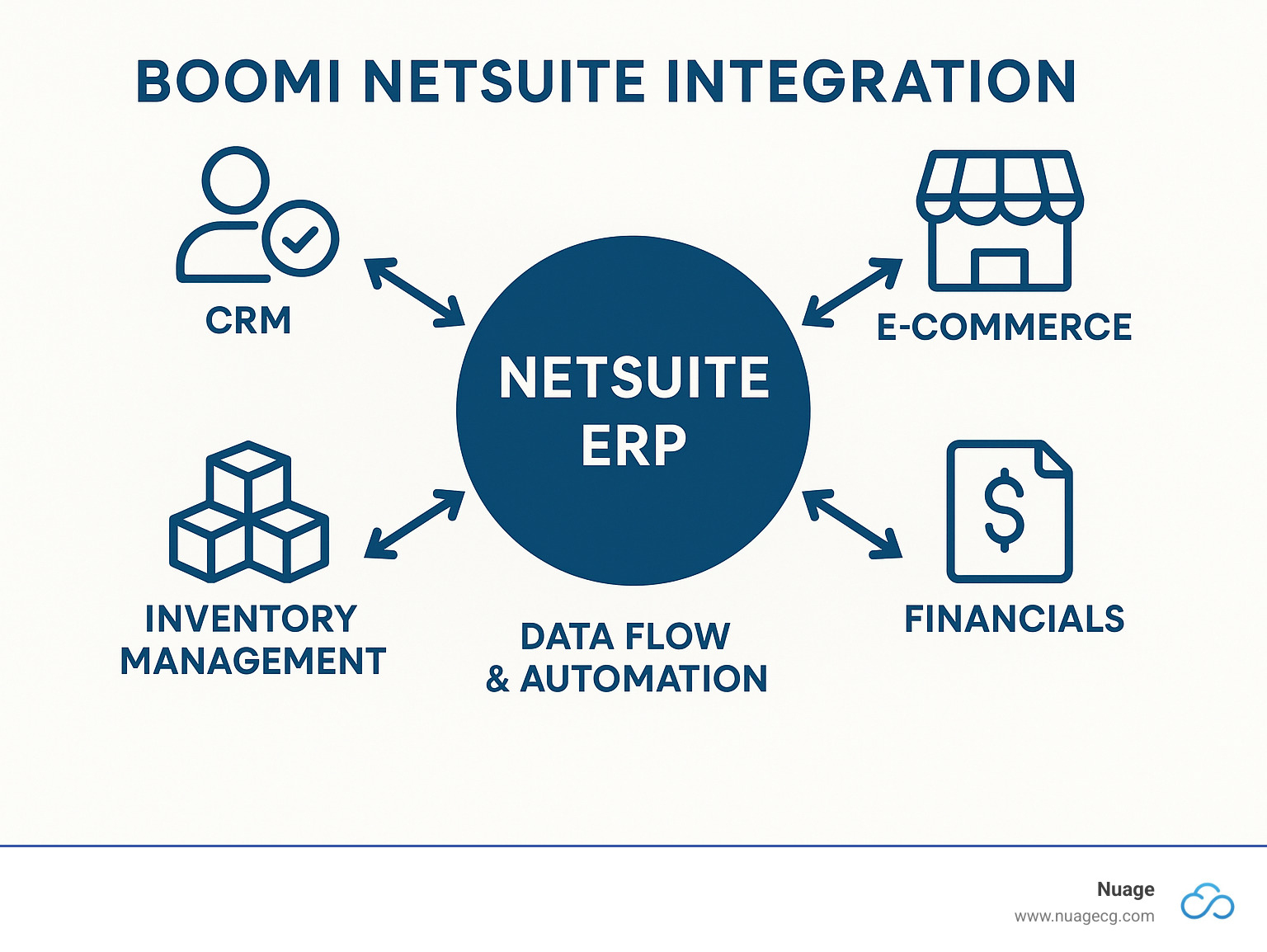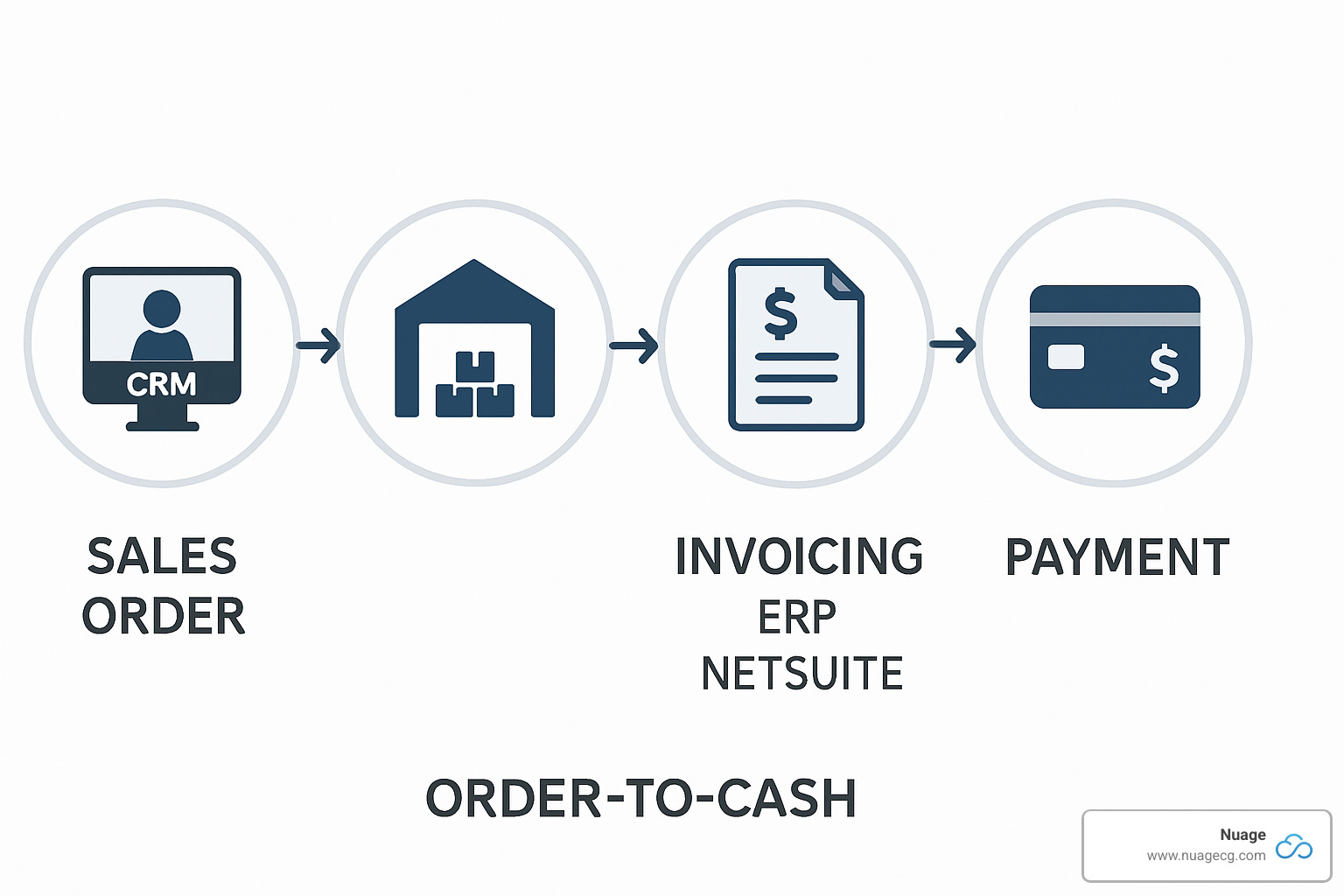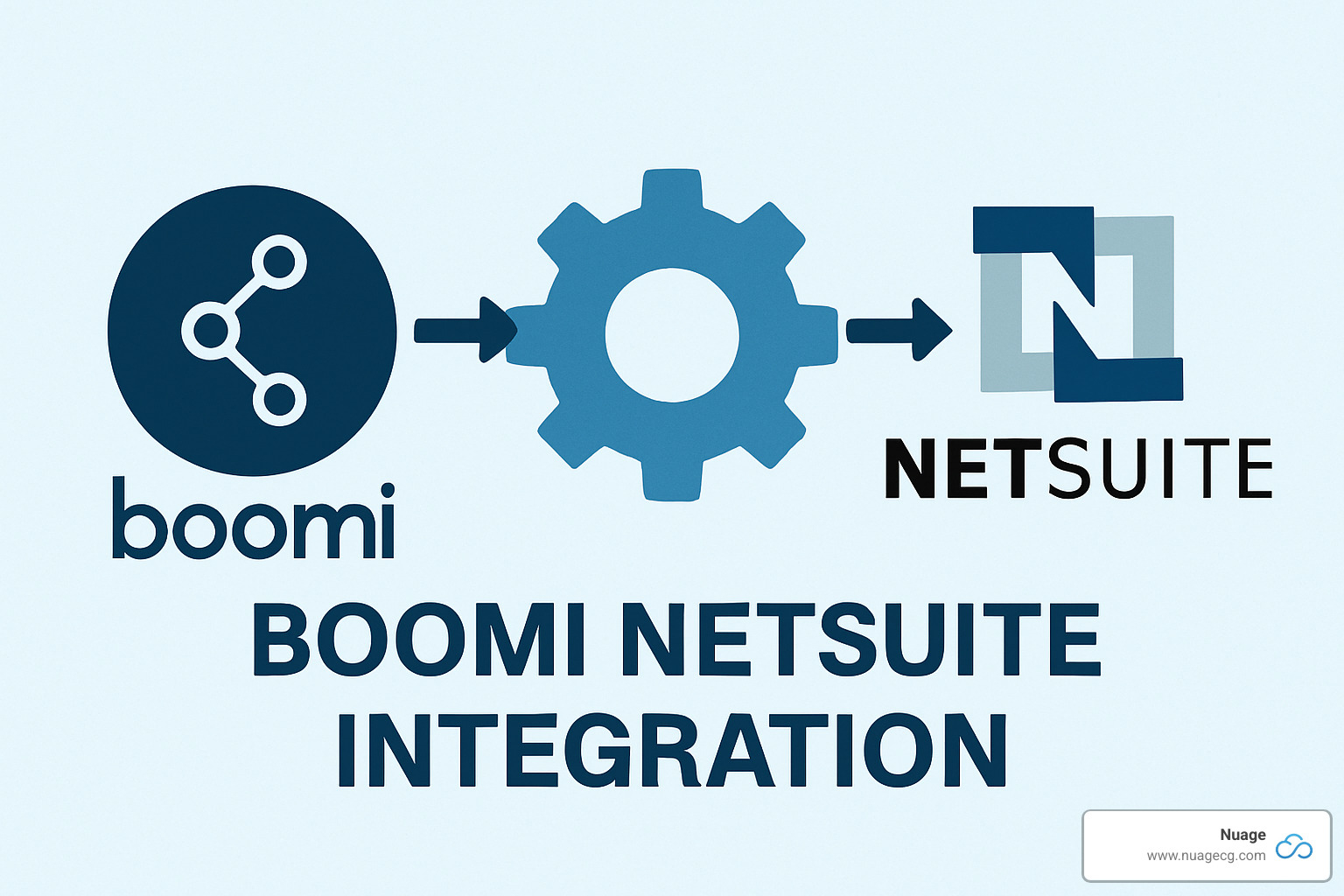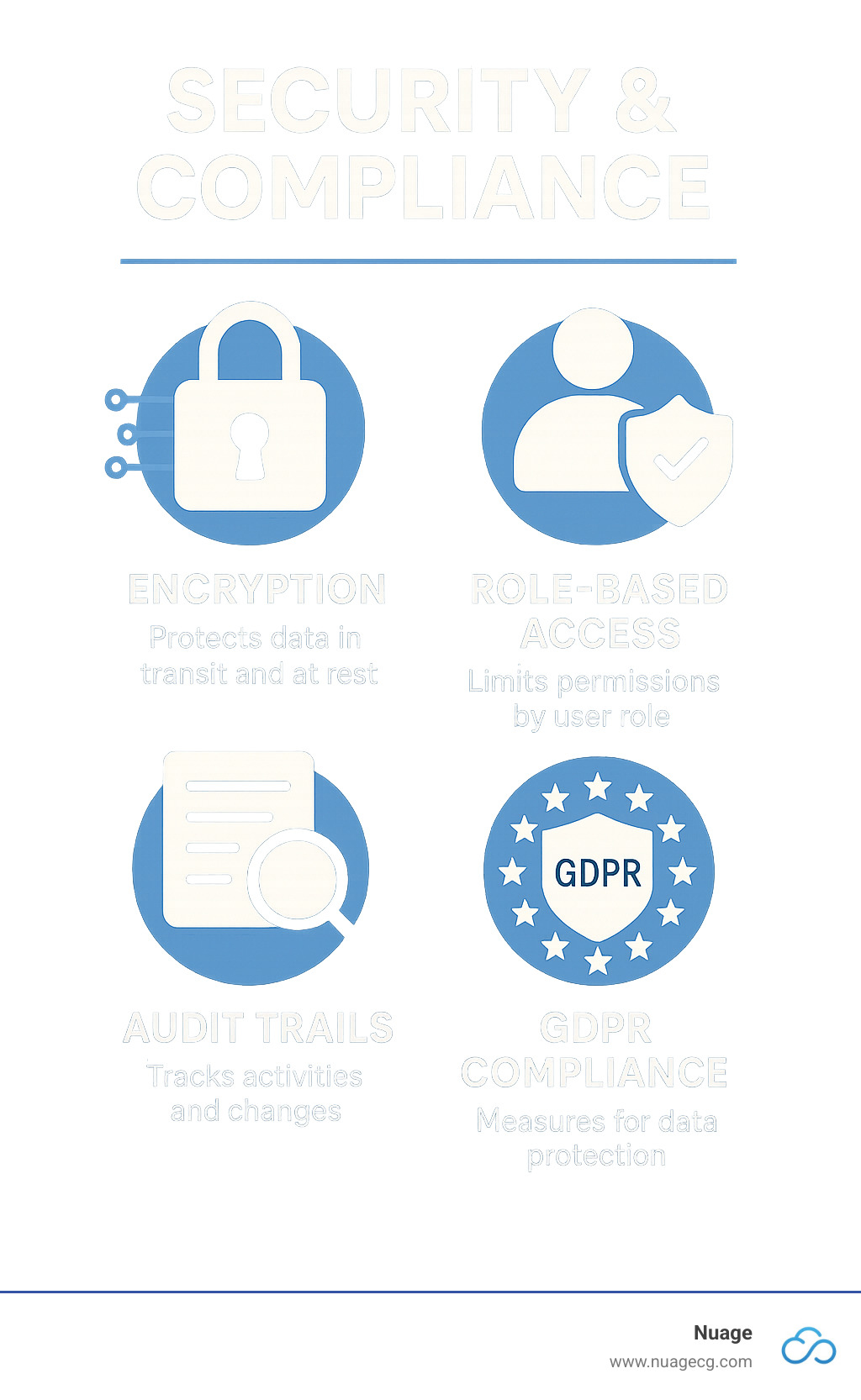Why Boomi NetSuite Integration Is Critical for Modern Business
Boomi NetSuite integration connects your NetSuite ERP with other business applications through Dell Boomi’s cloud-based integration platform. This powerful combination eliminates data silos, automates workflows, and creates real-time visibility across your entire tech stack.
Key aspects of Boomi NetSuite integration:
- Platform: Dell Boomi’s iPaaS connects NetSuite to 1,500+ applications
- Method: Uses NetSuite’s SuiteTalk API with token-based authentication
- Benefits: Eliminates manual data entry, reduces errors, accelerates processes
- Use Cases: Order-to-cash automation, inventory sync, CRM integration
- Timeline: Most implementations take 4-8 weeks
- Scalability: Handles real-time and batch processing for high volumes
The NetSuite integration market is forecasted to reach $12.5 billion by 2030, with 14.8% annual growth. This reflects how critical seamless data flow has become for competitive advantage.
Many businesses using NetSuite only tap into 20% of its potential because data remains trapped in disconnected systems. Boomi NetSuite integration breaks down these barriers by creating a unified ecosystem where information flows automatically between your CRM, e-commerce platforms, inventory systems, and financial applications.

What Is Boomi NetSuite Integration and Why It Matters
Boomi NetSuite integration is the digital bridge that connects all your business systems. Instead of having your NetSuite ERP sitting alone, Dell Boomi’s Integration Platform as a Service (iPaaS) creates seamless pathways for data to flow between NetSuite and every other application your business depends on.
The beauty of iPaaS lies in its simplicity. Rather than building dozens of separate connections, Boomi acts as your central hub. You design, deploy, and manage all your NetSuite integrations from one interface.
We’re living in the API economy, and companies that accept API-first strategies grow revenue 2.3 times faster than those with disconnected systems. When you combine NetSuite’s SuiteTalk API with Boomi’s connector library, you’re positioning your business for accelerated growth.
Boomi has earned recognition as a Gartner Magic Quadrant leader for Enterprise iPaaS eight years running. With over 20,000 customers worldwide, they’ve proven their platform handles enterprise-scale challenges. According to IDC research on cloud ERP growth, businesses increasingly demand integration capabilities that scale with growth.
The Rise of Connected ERPs
Today’s hybrid IT environments blend cloud and on-premise systems seamlessly. Your NetSuite ERP serves as the central nervous system, with data flowing automatically to specialized applications. This approach lets you choose the best tools for each job while keeping everything synchronized.
SaaS adoption continues accelerating, with roughly 15% of enterprise software purchases now cloud-based. While this creates opportunities to access cutting-edge functionality quickly, it also risks data silos that fragment business intelligence.
Real-time data synchronization has moved from “nice to have” to “must have.” Customers expect accurate inventory levels, real-time order tracking, and personalized experiences requiring instant access to information across multiple systems.
How Boomi NetSuite Integration Delivers Business Agility
Business agility is your ability to pivot quickly when markets shift or opportunities emerge. Boomi NetSuite integration turbocharges this agility by dramatically reducing time needed to connect new systems and scale operations.
The speed-to-value advantage becomes clear when you deploy new integrations in weeks instead of months. Boomi’s low-code environment means business users can participate in integration design rather than waiting for overloaded IT departments.
Time-to-market advantages compound over time. When you quickly connect new sales channels, payment processors, or logistics providers, you capture opportunities that slower competitors miss entirely.
Key Benefits & High-Impact Use Cases
When you implement Boomi NetSuite integration, you’re changing how your business operates. The real magic happens when data flows seamlessly between applications, eliminating friction that slows down teams and frustrates customers.
Organizations consistently report dramatic improvements in data accuracy, reduced manual work, and improved operational efficiency that shows up directly in the bottom line.

Order-to-Cash Automation With Boomi NetSuite Integration
Your order-to-cash process should flow smoothly, but without integration, it often feels fragmented. Sales creates opportunities in CRM, orders get entered into e-commerce platforms, warehouses fulfill through their systems, and accounting happens separately in NetSuite.
Boomi NetSuite integration transforms this into a smooth, automated workflow. When sales closes a deal in CRM, that order immediately appears in NetSuite with all necessary details for inventory allocation and financial processing.
Automation becomes apparent in the details:
– Sales orders flow automatically from CRM to NetSuite, triggering inventory checks
– Invoicing happens automatically when items ship
– Payment processing updates both financial records and customer accounts in real-time
– Fulfillment updates automatically trigger shipping notifications
Companies implementing this automation typically see processing times cut by 30-50% while eliminating manual transfer errors.
Omnichannel Commerce & 3PL Logistics
Today’s customers don’t think in channels – they want to buy wherever it’s convenient. Each touchpoint needs access to the same real-time information about products, pricing, and availability.
Boomi NetSuite integration makes omnichannel commerce work by keeping all sales channels synchronized. Whether using Shopify, BigCommerce, or other platforms, product catalogs and inventory levels stay perfectly aligned with NetSuite.
Third-party logistics (3PL) integration adds complexity many businesses struggle with manually. EDI transactions for shipping orders, inventory transfers, and advanced shipping notices need to flow seamlessly between your 3PL provider and NetSuite.
For technical implementation details, see our guide on NetSuite API integration.
Customer & Revenue Intelligence
Fragmented customer data is like solving a puzzle with pieces scattered across different rooms. Your CRM knows about sales conversations, e-commerce platforms track purchase behavior, and NetSuite handles financial relationships.
Boomi NetSuite integration creates a unified customer data hub that automatically synchronizes information between CRM systems like Salesforce, marketing automation platforms, and financial systems.
Marketing automation becomes more powerful when campaign data flows into NetSuite for revenue attribution analysis. You can finally answer “Which campaigns generate our highest-value customers?” and optimize marketing spend based on actual revenue results.
Your sales team benefits from complete customer intelligence within their CRM interface, seeing payment history, outstanding invoices, and purchase patterns without switching systems.
Technical Deep Dive: How Boomi Connects to NetSuite
Understanding how Boomi NetSuite integration works technically helps you make smarter implementation decisions and avoid common pitfalls.
NetSuite built its integration capabilities around SuiteTalk, a robust web services API that serves as the bridge between your ERP and external systems. SuiteTalk speaks both SOAP and REST protocols, ensuring compatibility with virtually any modern integration platform.
SuiteTalk provides comprehensive access to NetSuite’s data model. Every standard record – customers, items, sales orders, invoices – is accessible through the API. Even custom fields and objects you’ve created for unique business processes are available for integration.
Token-based authentication (TBA) replaces username/password approaches with something more secure and manageable. Instead of sharing login credentials, you generate specific tokens that grant precisely the access needed for each integration.
Boomi’s Atom runtime engines handle the heavy lifting of executing integrations. These lightweight Java applications can deploy in Boomi’s cloud, on your servers, or in a hybrid setup that keeps sensitive data on-premise while leveraging cloud scalability.
| Authentication Method | Security Level | Setup Complexity | Maintenance Requirements |
|---|---|---|---|
| Token-Based Auth (TBA) | High | Medium | Low |
| Basic Authentication | Low | Low | High |
| OAuth 2.0 | High | High | Medium |
Setting Up the NetSuite Connector in Boomi
Getting your boomi netsuite integration running starts with creating a secure handshake between platforms. This setup is more straightforward than you might expect.
First, create a NetSuite connection object within Boomi. This configuration file tells Boomi how to find and authenticate with your specific NetSuite instance. You’ll need your NetSuite account ID – the unique identifier that distinguishes your environment.
The application ID serves as Boomi’s introduction to NetSuite’s security system. Role permissions in NetSuite deserve careful attention – create a dedicated integration role with precisely the permissions your Boomi processes need.
Testing your connection before building complex integrations saves hours of frustration later. Boomi’s connection testing validates that all authentication elements are properly configured.
Data Mapping & Change Essentials
Cross-reference tables become essential when dealing with systems using different identifiers for the same business entities. Your CRM might identify customers by email while NetSuite uses internal IDs. Boomi’s lookup tables maintain these relationships.
SuiteScript custom fields require special attention during integration design. These fields often contain business logic affecting how data should be processed or validated.
Cache management strategies dramatically improve integration performance by reducing unnecessary API calls. Instead of repeatedly looking up the same customer information, Boomi stores frequently accessed data in memory.
Implementation Roadmap & Best Practices
Successfully implementing Boomi NetSuite integration requires a structured approach balancing speed-to-value with long-term scalability. The most successful projects follow proven methodology emphasizing iterative development and comprehensive testing.
Modern integration platforms deliver results quickly while building foundations for future growth. Boomi NetSuite integration projects often deliver initial value within weeks when approached systematically.

Step-by-Step Journey From Prep to Production
Every successful integration starts with solid project scoping that clearly defines what you’re trying to achieve. We map out all systems needing to connect to NetSuite, specific data flows, and business processes that will be transformed.
Requirements gathering becomes collaborative findy where business users, IT teams, and integration specialists work together to uncover real operational needs. The most important insights often come from people who actually use these systems daily.
Sandbox development provides a safe playground to build and test integration processes without risk to live business data. User acceptance testing reveals whether integration actually works in the real world, often uncovering scenarios that looked simple on paper but prove more complex in practice.
Production cutover doesn’t have to be nail-biting when planned carefully. We recommend a phased approach starting with less critical integrations and gradually expanding to mission-critical processes.
Overcoming Common Challenges
Large XML payloads can challenge even experienced developers. NetSuite sometimes generates massive XML documents with lots of custom fields or complex relationships. Boomi’s streaming capabilities and smart data filtering help manage these without bringing systems to their knees.
Error handling separates professionals from amateurs in integration design. Network hiccups happen, data validation fails, and systems occasionally have bad days. Boomi NetSuite integration includes built-in retry logic for temporary problems and dead letter queues for issues needing human attention.
Throughput optimization becomes crucial when processing thousands of transactions. Boomi’s parallel processing capabilities dramatically speed up large data synchronization tasks.
For organizations planning broader NetSuite implementations, our guide on NetSuite ERP implementation provides additional project planning insights.
Scaling for the Future With Pre-Built Accelerators
The Boomi Marketplace offers over 1,500 pre-built connectors that have been tested and validated. Instead of reinventing the wheel, you can leverage proven components to accelerate projects and reduce risk.
Building reusable integration components pays dividends as your integration portfolio grows. By designing modular processes easily adapted for new use cases, you create valuable assets making future projects faster and more cost-effective.
Research shows organizations can complete integration projects 60-70% faster than traditional development approaches. This speed advantage compounds over time as teams build experience and create libraries of reusable components.
Operating, Monitoring & Evolving Your Integration
Your Boomi NetSuite integration needs regular care to keep running smoothly. The real work begins after go-live when integrations start handling real business data and supporting critical operations.
Your integration platform becomes the nervous system of business operations. When working perfectly, nobody notices. When something goes wrong, everyone feels the impact immediately.
Process reporting gives you the pulse of integration health. Boomi’s built-in dashboards track everything from message volumes to processing times, helping you spot trends before they become problems.
Alert configuration acts as your early warning system. Smart alerts notify you when connections drop, error rates spike, or processing times exceed normal thresholds. The key is finding the right balance – too few alerts and you miss critical issues, too many and teams suffer from alert fatigue.
Dashboard creation transforms raw integration data into actionable insights. Executive dashboards focus on business metrics like order processing volumes and customer data accuracy. Technical teams need different views showing system performance, error trends, and capacity utilization.
Continuous Improvement for Boomi NetSuite Integration
Your boomi netsuite integration should evolve alongside your business. What worked for a 50-person company might struggle when processing ten times the transaction volume.
Key Performance Indicators provide the foundation for improvement decisions. Processing time per transaction tells you if integrations keep pace with business growth. Error rates reveal data quality issues or system compatibility problems.
Data quality audits prevent the slow drift toward inconsistency that plagues many integration environments. Customer records that don’t match between systems, inventory counts that diverge over time, or pricing discrepancies – these problems start small but compound quickly.
Performance tuning becomes necessary as your business scales. Boomi provides various optimization options including intelligent caching, parallel processing, and batch size adjustments.
Security, Compliance & Data Governance
Security isn’t something you set up once and forget. The threat landscape evolves constantly, and your Boomi NetSuite integration security measures need to evolve with it.
Encryption protects business data throughout its journey between systems. Boomi uses industry-standard encryption protocols for all data transmission, while NetSuite provides robust encryption for stored data.
GDPR and privacy regulations require specific handling of personal data throughout the integration lifecycle. Boomi’s data masking and anonymization capabilities help ensure compliance without breaking business processes.
Role-based access control follows the principle of least privilege – integration processes get only minimum permissions required. Audit logs provide comprehensive tracking of all integration activities, essential for compliance reporting and security incident investigation.
For organizations looking to optimize overall NetSuite performance alongside integration improvements, our guide on improving NetSuite performance offers complementary strategies.

Frequently Asked Questions about Boomi NetSuite Integration
How long does a typical project take?
Most Boomi NetSuite integration projects take between 4-8 weeks from requirements meeting to go-live success. Every business is unique, and your timeline depends on several key factors.
Complexity of data mappings plays the biggest role in project duration. Straightforward field-to-field mappings move quickly, but complex business logic that transforms data or applies specific validation rules naturally extends development time.
The number of systems you’re connecting also impacts timeline. Linking NetSuite with a single CRM system usually takes 4-6 weeks. Comprehensive integration hubs connecting multiple e-commerce platforms, warehouse systems, and financial applications require the longer end of that range.
Customization requirements can speed things up or slow them down. Pre-built connectors from Boomi’s marketplace accelerate projects. Custom business logic and unique data changes require more development time but deliver more custom value.
Our most successful implementations happen when organizations come with clearly defined requirements and dedicated project teams. These projects often wrap up in 4-6 weeks, while more complex scenarios might need 8-12 weeks.
Can Boomi handle high-volume NetSuite transactions?
Absolutely! Boomi is built for enterprise-scale transaction volumes. We’ve seen it handle everything from small businesses processing hundreds of orders monthly to large enterprises managing millions of transactions annually.
Parallel processing is one of Boomi’s strongest features for high-volume scenarios. Instead of processing transactions one at a time, Boomi handles multiple transactions simultaneously, dramatically improving throughput.
Batch processing capabilities shine during heavy-duty operations like nightly data synchronization. Rather than individual API calls for each record, Boomi processes thousands of records in optimized batches, reducing load on both systems.
Caching mechanisms provide another performance boost by storing frequently accessed reference data locally. Instead of making API calls to NetSuite every time you need customer IDs or product codes, Boomi caches this information and dramatically reduces processing time.
The key to handling high volumes successfully is proper architecture design that matches processing patterns to business requirements.
What skills does my team need after go-live?
Boomi NetSuite integration doesn’t require rocket scientists to maintain successfully. Most organizations find they can handle ongoing operations with the right combination of business knowledge and basic technical skills.
Understanding your integrated business processes is more important than deep technical expertise. Your team needs to know how data flows between systems, what business rules apply, and how to spot when something isn’t working as expected.
Basic Boomi platform administration covers day-to-day monitoring and maintenance tasks including checking process reports, reviewing error logs, and understanding how to restart failed processes. Boomi’s user-friendly interface makes these tasks manageable for business users with basic technical comfort.
Integration troubleshooting abilities round out the essential skill set. Your team should know how to identify whether issues are data-related, system-related, or process-related, and when to escalate problems to specialists.
Many clients find that training 1-2 team members as “integration champions” provides sufficient internal capability for ongoing maintenance. These champions handle routine monitoring and basic troubleshooting while escalating complex issues when needed.
Conclusion
Boomi NetSuite integration isn’t just about connecting software – it’s about changing how your business operates in a connected world. Think of it as building bridges between islands of data, creating a flowing ecosystem where information moves naturally to where it’s needed most.
Organizations with well-integrated systems respond 40% faster to market changes and make data-driven decisions that consistently outperform competitors. As the integration market races toward $12.5 billion by 2030, companies that accept comprehensive integration strategies today will find themselves ahead of the curve tomorrow.
What really matters is your team’s daily experience. When sales representatives see real-time inventory levels during customer calls, when warehouse staff receive automated shipping instructions, and when executives access unified dashboards – that’s when integration transforms from a technical project into a competitive advantage.
At Nuage, we’ve spent over 20 years helping organizations steer digital change waters. Our experience spans from Manhattan Beach, California to Jacksonville, Florida, and everywhere in between. What we’ve learned is that successful integration isn’t about pushing the latest technology – it’s about understanding your unique business challenges and crafting solutions that fit perfectly.
As your NetSuite Optimization Engine, we focus on determining what actually works for your specific situation. Every business has its own rhythm, pain points, and definition of success. Our job is to listen, understand, and design integration architectures that deliver measurable results.
The path forward starts with honest conversation. We begin every engagement by thoroughly assessing your current systems, understanding your business processes, and identifying integration opportunities that will deliver the biggest impact.
Your NetSuite investment deserves to reach its full potential. When properly integrated with your other business systems, NetSuite becomes the central nervous system that powers efficient operations, accurate reporting, and agile decision-making.
Ready to explore what Boomi NetSuite integration can do for your organization? Our comprehensive NetSuite consulting services provide the expertise and partnership you need to design, implement, and optimize integrations that drive real business results.
The future belongs to connected businesses. Let’s build yours together.
Need Help with NetSuite Integrations?
At Nuage, we specialize in NetSuite Optimization and can help you build robust integrations that keep your systems in sync.
Learn about NetSuite’s native integration capabilities in this video:
Our Managed Services team can handle your integration needs, and our 24/7 Support ensures your integrations stay running smoothly.
Related Resources
Not sure if your NetSuite is optimized? Take our free NetSuite Scorecard to get a personalized assessment.
Want to see how we’ve helped other companies? Check out our customer success stories.
Last Updated: January 4, 2026

